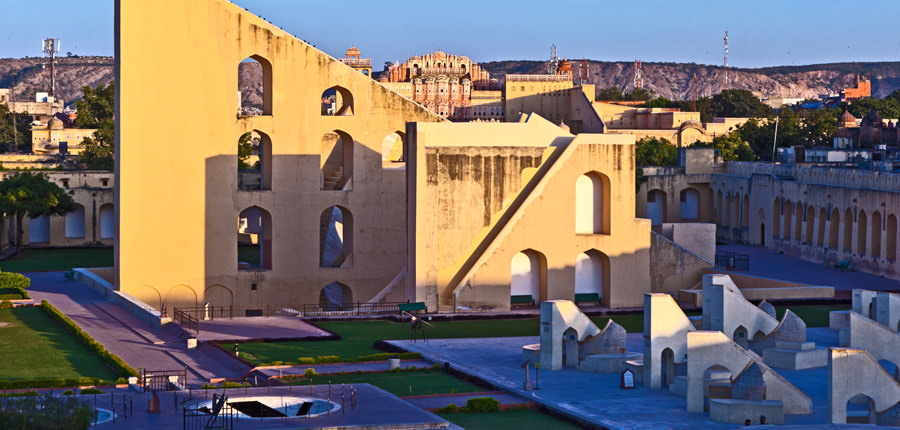The Jantar Mantar Jaipur has been regarded as a World Heritage site by UNESCO. As it can be interpreted from its name “Jantar (Instrument) Mantar (Formula)” is an ancient scientific instrument which was used in many scientific calculations such as tracking stars' location as the earth orbits around the sun, measuring time, predicting eclipses, ascertaining the declination of planets, and determining the celestial altitudes and related ephemerides.
Even today, Jantar Mantar, Jaipur is used for various astronomical purposes. UNESCO has inscribed this place on the World Heritage List as " an expression of the astronomical skills and cosmological concepts of the court of a scholarly prince at the end of the Mughal period"
Built by Sawai Jai Singh in 1728, Jantar Mantar is a collection of Stone-Made, huge scientific instruments. Sawai Jai Singh was very fond of Astromony.
He was a scholar and have studied works of various Hindu, Europeans astronomers. He was a great follower of the work of Ulugh Beg, and Uzbek astronomer. In 1724 A.D.
Sawai Jai Singh built an alarge observatory in Delhi using large instruments made up of Brass. In his view, such instruments could provide more exact and precise reading than smaller ones of brass.
After that, he built them in Jaipur, Ujjain, Mathura, and Varanasi.
The observatory in Jaipur was built in 1734 A.D. and is the largest amongst the one’s he built. Sawai Jai Singh himself used to take astronomical readings in this observatory situated near his palace, now popularly known as “The City Palace”.
The Jantar Mantar of Jaipur id the largest amongst the five other built in India and comprises of 19 instruments that can predict eclipses, time, tracking of the stars and much more.
This sound & light show is a tribute to the ingenuity of Raja Sawai Jai Singh II, who engaged himself with such scientifically oriented adventures, even in politically turbulent times.
The episodes narrate the making of Jantar Mantar and the need felt by Raja Jai Singh to shift the Kachwaha capital from Amber to the new capital city of Jaipur.
The episodes also include stories about important astronomical instruments through graphical imagery, scintillating light effects and evocative music.
Show Timings
| Time | English | Hindi |
|---|---|---|
| Oct – Feb | 6:30pm | 7:30pm |
| Mar – Apr | 7:00pm | 8:00pm |
| May – Sep | 7:30pm | 8:30pm |
Show Duration: 45 minutes
For Booking Jantar Mantar Sound & Light Show : +91-93516 17799 , +91-93515 90055 (Speaking Facades)
Jantar Mantar Timings : The Jantar Mantar, Jaipur is open for general public only from 9:00 AM to 4:30 PM every day.
Janatar Mantar Jaipur Entry Fees : Entry fee is Rs. 40 for Indians and Rs. 200 for foreigners. Still and moving cameras incur an additional fee.
Guided Tours : You can also enjoy guided tour inside the place at just Rs. 200, which lasts from 40 to 60 minutes.

Leave a Reply